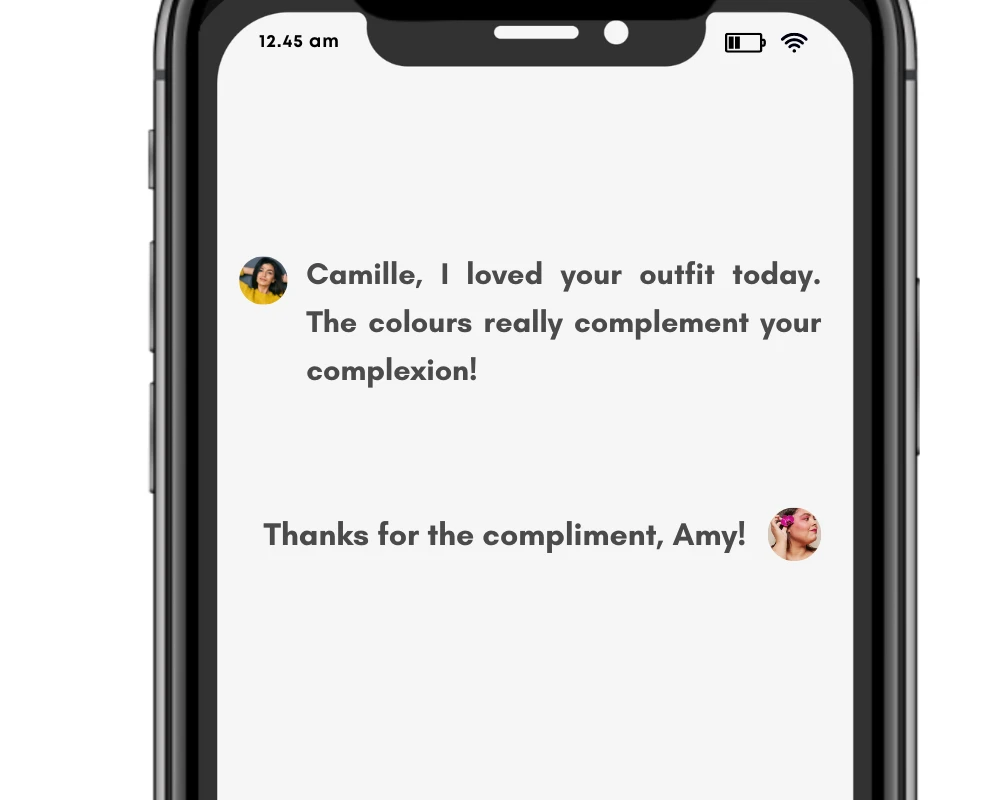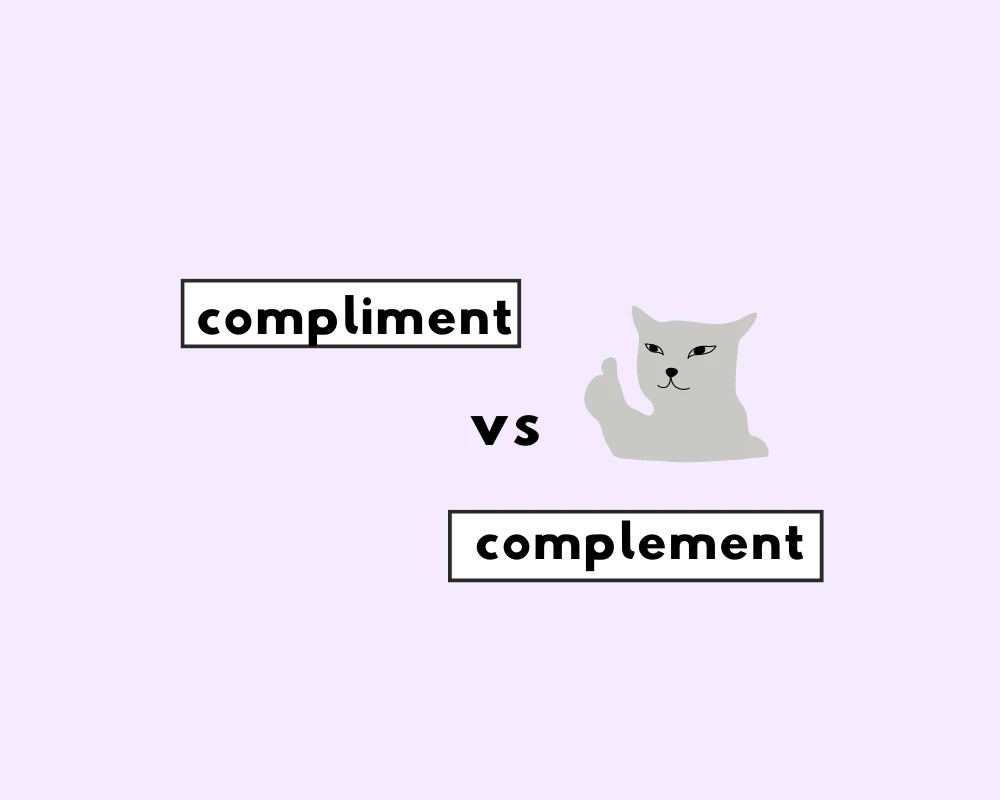
Compliment vs Complement
The new curtains are a perfect complement to the room’s decor.
She complimented his courage during the difficult presentation.
His quiet nature really compliments her outgoing personality.
I received many complements on my excellent public speaking.
If someone says you look nice, do you return the compliment or … complement? If the difference between them eludes, see below. It’s complimentary.
When to use compliment vs complement
Despite being a mere letter apart and sounding the same, “compliment” and “complement” are two different words that are not interchangeable.
Both complement and compliment have noun, verb, and adjective forms, making them slightly trickier homophones (i.e., words that sound the same but mean different things).
| Examples with “compliment“ | Examples with “complement“ |
| She received several compliments on her speech. | This vegetable’s sweetness is a perfect complement to heavier foods. |
Forms of compliment & complement
If you give someone a compliment, or vice versa, this means you said something nice or admiring to someone, and is the verb form of the word. As an example, she complimented my vocabulary.
As a noun, compliment refers to the comment or expression of praise that’s given, (“please don’t take it as an offence, I meant it as a compliment!“)
| Forms of “compliment“ |
| [noun] My compliments to the chef! |
| [verb] She complimented him on his excellent German. |
| [adjective] She was happy to receive complimentary feedback on her essay. |
Forms of the word “complement”
Complement as a verb describes improving or enhancing something else by combining with it. For example, “we need players on the team that will complement each others strengths and weaknesses“.
As a noun, a complement refers to whichever thing enhances or improves (read: completes) what it’s added to or made to be a part of.
| Forms of “complement“ |
| [noun] This shade beautifully complements the color of your eyes. |
| [verb] Her vibrant personality really complements his laid back demeanour. |
| [adjective] We need managers with unique but complementary skills. |
Complimentary vs. complementary
As an adjective, complimentary is something free of charge; as in, “The hotel offers complimentary breakfast“. Also, something that’s complimentary (about or towards something) describes a comment as a compliment; as in “She had some very complimentary remarks about my writing”.
Complementary, as an adjective, is similar to its verb/noun form. It describes something (people or things) coming together to form a useful or improved combination (whether of skills, qualities, or aesthetically). For example, “The board members have different but complementary backgrounds”.
| Examples with “complimentary“ | Examples with “complementary“ |
| After one or two complimentary remarks about her hosts, she got to the main part of her speech. | We provide a service that is essentially complementary to that of the banks. |
The etymology of compliment & complement
Complement and compliment share an origin and come from the same Latin word, complere, “fill up”. Complement is still true to its original Latin meaning, “to fill up, finish, suit”. ‘Compliment‘, on the other hand, has strayed from its etymological definition and now refers to “pay a compliment to, flatter or gratify by expression of admiration, respect, etc.”
To remember the difference, think of “complement” as short for “complete“, meaning something that completes or perfects something else.
**compliment** (praise) has an ‘I’ like ‘I love it!’ **Complement** (complete) has an ‘E’ like ‘Enhance.’.
Synonyms of compliment
- admiration
- adulation
- applause
- courtesy
- homage
- acclaim
- appreciation
- approval
- encomium (a piece of writing that expresses praise)
Synonyms of complement
- accompaniment
- completion
- counterpart
- balance
- addition
- enhancement
- enrichment
- supplement
- correlative
- augmentation
Phrases with ‘compliment’
| phrase | meaning |
| a backhanded or left-handed compliment | An insult that’s expressed as praise. |
| a compliment sandwich | Criticism or feedback that’s sandwiched between comments of praise. |
| to return the compliment | Literally, to say something nice to someone after they’ve praised you. |
| compliments of the house | Said from a merchant or establishment when they offer something free to guests. |
| to fish for compliments | To attempt to elicit praise from someone. |
Origin of ‘compliment’
1610s, “pay a compliment to, flatter or gratify by expression of admiration, respect, etc.,” from French complimenter, from compliment (see compliment (n.)). By 1690s as “manifest kindness or regard for by a gift or favor.”
Origin of ‘complement’
Late 14c., “means of completing; that which completes; what is needed to complete or fill up,” from Old French compliement “accomplishment, fulfillment” (14c., Modern French complément), from Latin complementum “that which fills up or completes,” from complere “fill up”.
Discover other commonly confused words
Sources
- Harper, Douglas. “Etymology of compliment.” Online Etymology Dictionary, https://www.etymonline.com/word/compliment. Accessed 19 August 2023.
- Harper, Douglas. “Etymology of complement.” Online Etymology Dictionary, https://www.etymonline.com/word/complement. Accessed 19 August 2023.
- Harper, Douglas. “Etymology of complement.” Online Etymology Dictionary, https://www.etymonline.com/word/complement. Accessed 19 August 2023.
- “Compliment.” Merriam-Webster.com Dictionary, Merriam-Webster, https://www.merriam-webster.com/dictionary/compliment. Accessed 19 Aug. 2023.
- “Compliment.” Farlex Dictionary of Idioms. 2015. Farlex, Inc. 4 Nov. 2023 https://idioms.thefreedictionary.com/compliment
Work Sheet
According to the post, which word is used for something that completes or enhances something else?
The blog post states that to give someone a compliment means you did what?
Based on the examples, which word correctly fills the blank: “She ______ his courage during the difficult presentation.”?
According to the post, which sentence uses the word correctly?
Besides meaning “free of charge,” what other meaning does the adjective “complimentary” have, according to the post?
Fill in the blank with the correct word: The bright scarf was the perfect to her simple dress.
Fill in the blank with the correct word: He received a great on his presentation skills.
Fill in the blank with the correct word: The hotel guests enjoyed the breakfast each morning.
Fill in the blank with the correct word: Their different skills were to each other, making them a strong team.
Fill in the blank with the correct word: His calm demeanor really her energetic personality.
Frequently Asked Questions
What is the main difference?
+
What does “compliment” mean?
+
What does “complement” mean?
+
Are complement and compliment interchangeable?
+
What’s the difference, complimentary vs complementary?
+
Yash, D. "Compliment vs. Complement (Definition & Examples)." Grammarflex, Jun 14, 2025, https://www.grammarflex.com/when-to-use-complement-vs-compliment/.











